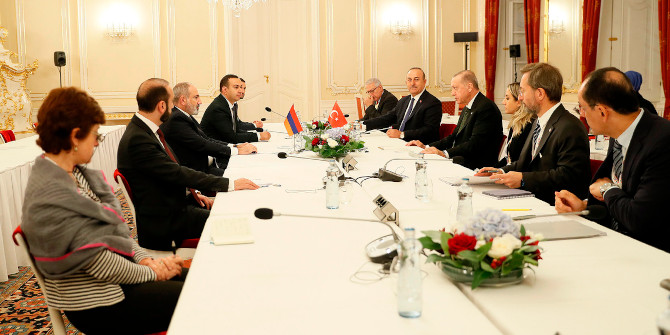Portugal will hold a presidential election on Sunday, which is widely expected to be won by incumbent President Marcelo Rebelo de Sousa. Yet as Mariana S. Mendes writes, the key story of the election may well be the continued rise of André Ventura, leader of the radical right party Chega.
At the same time that Portugal’s daily Covid-19 numbers are hitting record highs, the country will head to the polls this Sunday to elect its future head of state. As there is little doubt that the incumbent President Marcelo Rebelo de Sousa will score a landslide victory and secure a second term in office, all eyes are instead set on how well the far right is going to perform.
André Ventura, leader of the radical right party Chega (Enough), is likely to achieve a respectable result, with opinion polls predicting he will win up to 11 per cent of the popular vote, and thus be in close competition for second place in the election. This is no small feat as his party was only established in mid-2019, before securing one parliamentary seat in the October 2019 general election.
Though its share of the popular vote was then marginal (1.3%), this was nonetheless a watershed moment as it put an end to Portuguese exceptionalism regarding the absence of far right forces in parliament. What is more, Ventura has taken advantage of the intense torrent of media attention surrounding him and his party. Chega has grown exponentially in popularity since then, with polls indicating that it now has enough support to become the fourth largest party in Portugal (in close proximity to the third).

Candidate debate between Vitorino Silva and André Ventura on 4 January 2021, Credit: Pedro Pina | RTP (CC BY-NC-SA 2.0)
The party’s sudden rise is already sending shock waves through the Portuguese party system, sparking much debate on the reconfiguration of the right-wing political space. The posture of the mainstream right towards the new challenger was put to the test following the October 2020 Azorean regional elections, where a potential alliance of the various right-wing forces (including Chega, who polled 5% of the vote) gave them a majority over the left.
Though Chega stayed out of the regional cabinet, it entered into an agreement with the mainstream right, exchanging its support for a series of demands. It is thus largely anticipated that, should a similar configuration occur at the national level, there will be no cordon sanitaire policy similar to the one applied in Germany or in Sweden until recently. In other words, Chega is well on its way to becoming a political actor with systemic importance, that is, with potential to directly influence policy outcomes, even though the party has only recently been created.
Though the presidential elections are, in principle, of less interest to the party than parliamentary ones, André Ventura’s presence in the presidential campaign and concomitant television debates has given him and his ideas prime time in the media, possibly to his advantage. For all his possible flaws, none of his fierce critics would deny he has sharp and astute rhetorical skills, capable of putting his adversaries on the defensive or outside their comfort zone. His years as a TV commentator on football and true crime legal shows have certainly helped.
In fact, Chega itself is largely the enterprise of André Ventura (who is also the sole party representative in parliament). His personal appeal has attracted different people to the party, who are, above all, held together by reverence of Ventura. This has not prevented serious internal feuds and splits, though. In political science jargon, Chega corresponds, for the time being, to a personal or charismatic party, with a weak organisational identity and very low levels of institutionalisation.
A quintessential populist radical right party
Ventura’s tactics and topics of interest are prototypical right-wing populist. Among his most controversial claims during the current campaign is the one that the he “will not be the President of all Portuguese”, but only of the good or decent Portuguese (“Portugueses de bem”). Amid those he excludes from that definition are, most preeminently, criminals and people who live on state subsidies. This speaks volumes about his agenda, which is heavily focused on criminality (and support for the police) and the alleged misuse of public money, be it in terms of corruption at the top or undeserving welfare recipients at the bottom. Among the latter, ‘gypsies’ are often explicitly targeted.
If radical right-wing populists are known, above all, for a moralist and highly divisive vision of society – pitting the pure and hard-working people against both the corrupt elite and immigrants –, then Ventura’s rhetoric and strategy squarely places his party in this political family. Nevertheless, when comparing Ventura to many of his peers in Europe, his focus is less on welfare chauvinism and more on the stigmatisation of welfare recipients in general. He goes as far as to often claim that “half of the country works to pay for those who do not want to work”.
While this kind of rhetoric is, to an extent, opportunistic, it is also in line with the neoliberal economic positions of his party. Chega is, for the time being, reminiscent of the way other European radical right-wing parties were in their early stages, such as the Front National, who started off as staunch neoliberal parties, that is, advocating a minimal state regime, with low taxes.
In its electoral programme, Chega goes as far as to advocate for the suppression of the redistributive functions of the state. However, there is a significant gap between the party’s electoral programme and the rhetoric of its leader. As with other radical right forces, Chega is not keen on emphasising its economic agenda. Instead, Ventura is focused on increasing the salience of other issues while attempting to blur his party’s positions on economic issues, a typical tactic intended to broaden the party’s appeal.
The purpose Ventura has set himself to is, most obviously, to mobilise resentment against the political establishment. In fact, even his economic ideas are in part justified on the basis they are needed to reduce the establishment’s predatory practices. In an obvious attempt to take advantage of the widespread public perception that corruption is endemic among the political class, Ventura magnifies the extent to which “socialism and corruption are killing our nation” and promotes radical system change – a “IV Republic” –, including a new constitution, a presidential political system and a slash in the number of parliament seats. Though we still know little about Chega’s supporters, it is not too far-fetched to predict that its most fertile breeding ground lies here, given the high levels of distrust in the political class among the Portuguese electorate as well as extraordinarily high levels of political disaffection.
Showing he is well aware of populist ‘winning formulas’, Ventura’s anti-establishment posture goes hand in hand with a stance against so-called ‘political correctness’ and concomitant utterance of what are taken to be ordinary people’s ideas – the elusive but ever-present ‘silent majority’. This is used to justify a number of controversial stances, ranging from the introduction of life imprisonment to emphasis on alleged problems with minorities. These fall neatly into the authoritarian and nativist appeals typical of the populist radical right.
Among the latter, the Roma community has been a recurrent target, accused of living on welfare benefits, refusing to integrate and failing to abide by the law. Ventura often extends these critiques to minorities in general. In particular, he has taken issue with anti-racist rallies, organising counter-rallies on the basis that “Portugal is not a racist country” and that “minorities have rights, but also duties”. This goes hand in hand with calls for greater police protection – implicitly or explicitly connecting minorities to crime – as well as with general nationalist appeals (such as “we are proud of our [colonial] history”). Coincidently or (most likely) not, Portugal has recently recorded a surge in racist crimes and rhetoric.
Chega’s surge in popularity is yet another confirmation of Cas Mudde’s assertion that no country is immune to nativist, authoritarian and populist appeals. Mudde predicted that, if there are still countries with unsuccessful far-right parties, this is more a matter of supply than demand, as they just have “not yet been confronted with the right populist radical right party or political entrepreneur”. The Portuguese example shows that he is, to a great extent, absolutely right.
Note: This article gives the views of the author, not the position of EUROPP – European Politics and Policy or the London School of Economics. Featured image credit: Pedro Pina | RTP (CC BY-NC-SA 2.0)





A brilliant article which lucidly explains Chega. It would have been helpful if the author were to give her view on the possibility of Chega actually changing the Constitution on the probability of Ventura’s political adventure culminating in a Constitutional change to the Presidential system and his becoming a “Trumpianphant” President for Life !
Desiderio
Definitely too much corruption and too many seats in parliament.
On that I agree with Ventura